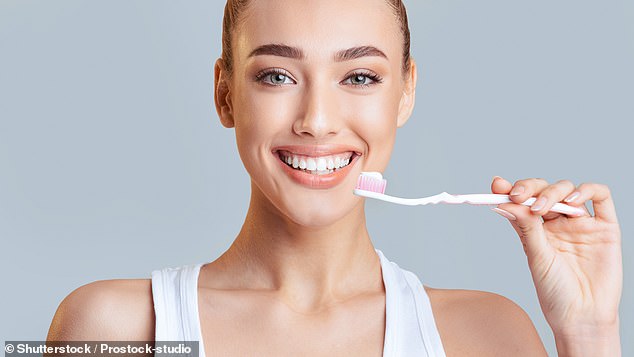If you find yourself reaching for a whitening toothpaste to enhance your smile, think again – because it could lead to irreversible damage.
Dr James Martyniak, who is part of the team at Rifkin Dental in Carmel, New York, says whitening paste is largely ineffective.
He explains in a TikTok video: ‘Whitening toothpastes do not actually whiten your teeth they just remove external stains by scrubbing away layers of enamel which can make your teeth look whiter at first.’
The dental expert warns whitening toothpastes can actually go on to cause damage over time, leading to ‘thinner, more yellow, and sensitive teeth.’
Whitening toothpastes can potentially make your teeth thinner because they often contain higher levels of abrasives compared to regular toothpastes.
Colgate says that all toothpastes are graded on their abrasiveness using something called the Relative Dentin Abrasivity (RDA) score, and the American Dental Association (ADA) sets an ‘upper limit’ of an RDA score of 250.
However, anything above 101 is considered ‘highly abrasive’ and scores between 151 and 250 are ‘extremely abrasive’ and ‘regarded as a harmful limit.’
There are approximately 15 whitening toothpaste products that fall between the scores of 101 and 250.

A dentist has revealed why he discourages his patients from using whitening toothpaste, with it leading to potentially permanent damage
In addition to abrasive toothpaste, some people may already be more prone to enamel damage than others, as their diet and certain medical conditions can have an effect on tooth strength.
If your enamel wears away, it can expose the dentin underneath, which is a hard tissue making up the bulk of a tooth and is yellow in color.
For this reason, Dr Martyniak highlighted, whitening toothpastes can actually make your teeth appear more yellow than white.
It can also lead to your teeth becoming thinner, with the protective outer layer wearing away.
This in turn can increase your risk of cavities, as it easier for bacteria to penetrate and cause decay.
If your teeth become significantly thinner due to enamel erosion, they can eventually fall out.
On the subject of sensitivity, Indiana-based dentist Dr Matthew Wittrig agrees that tooth whitening toothpastes can serve as an irritant.
Explaining why this happens, he says: ‘When whitening toothpastes are used regularly, some patients experience increased tooth sensitivity, which can feel like a wave or rush of pain as a response to cold air or cold liquid.

Dr James Martyniak, who is part of the team at Rifkin Dental in Carmel New York, says that whitening paste is largely ineffective
‘While we don’t exactly know why whitening toothpaste increases sensitivity, the likely culprit is the peroxide that acts as the main ingredient to help bleach the tooth’s surface.
‘The peroxide can irritate the tooth’s nerve, which causes inflammation and irritation that contributes to symptoms such as tingling or cold sensitivity.’
Along with making your teeth thinner, more yellow, and sensitive, Dr Wittrig says whitening toothpastes can also cause tissue damage around the gum area.
He adds: ‘Whitening toothpastes with higher concentrations of peroxide can cause gum irritation, and even tissue damage, if they are used more frequently than the label recommends.
‘Gel whitening strips or trays can also cause chemical burns if the peroxide sits on mouth tissue for too long instead of the tooth.
‘If you are going to use these products at home, be careful to wipe excess whitening agents off your gums and mouth tissue.
‘Similarly with abrasive whitening toothpastes, the active ingredients like baking soda can cause irritation in some patients. If you notice a reaction to whitening products, stop using them immediately.’
For those looking to achieve a whiter smile, Dr Wittrig advises investigating professionally-applied peroxide products such as gel trays or strip.
This is because dentist-administered teeth whiteners are able to ‘penetrate deeper into the tooth to reach stains in the tooth enamel that over-the-counter whiteners can’t’.
And, to avoid enamel damage, Colgate advises: ‘Remember to always follow the instructions on the label and use your toothpaste no more often than directed.
‘And for best results, pair your toothpaste with a soft-bristled toothbrush and use a gentle brushing technique – no hard scrubbing!’
This article was originally published by a www.dailymail.co.uk . Read the Original article here. .


